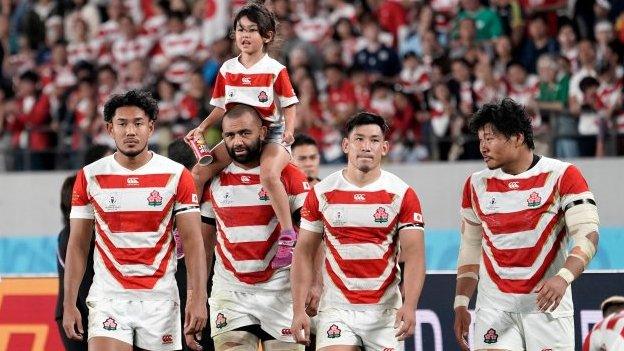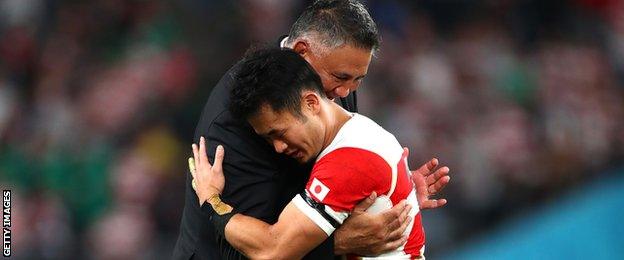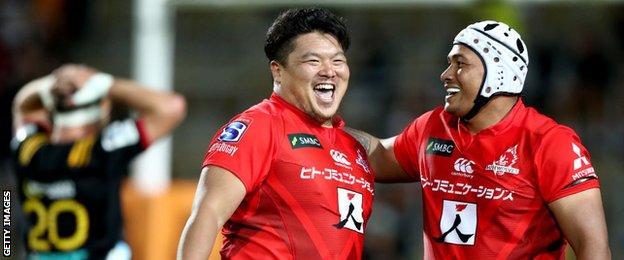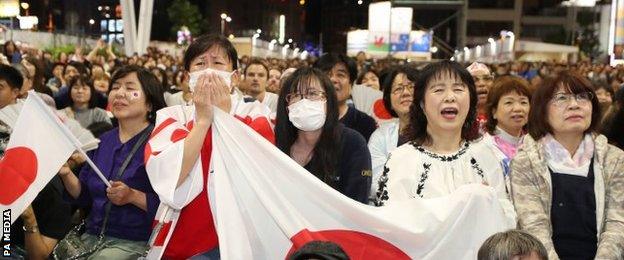Rugby World Cup: What next for Japan's Brave Blossoms?
- Published

At 31, captain Michael Leitch, second from left, may have played at his last World Cup
Read a version of this article in Japanese here
As ever when the lights come up at a party's end, the view for Japan in Tokyo Stadium on Sunday evening was a little sobering.
After sweeping Ireland, Scotland and all the rest before them in the Pool A, the Brave Blossoms were ultimately well beaten by South Africa in the last eight.
A scoreline of 26-3 revealed that, for all the distance travelled, Japan still have a way to go before they are genuine contenders for a global crown.
So, after making their debut in the knock-out stages, how do Japan make sure they are a regular fixture at the business end of tournaments to come?
The coaching question

Joseph, who represented both New Zealand and Japan during his playing career, 'changed Japan's mentality'
New Zealand, Ireland, Australia and Wales are all losing a head coach at the end of the tournament.
Some have a succession plan in place. Others haven't. And there may yet be more upheaval elsewhere.
Japan's well-drilled, united displays won't have harmed the credentials of head coach Jamie Joseph and his lieutenants Tony Brown and Scott Hansen should any vacancies arise.
The testimonies from within the camp have been glowing.
"The reason that this team has changed is because of Jamie Joseph, in how he led us and how he taught us rugby," said captain Michael Leitch.
"Our mentality has changed since Jamie became head coach," added centre Ryoto Nakamura.
"I can't tell you," said Joseph, for his part, when asked about his future in the wake of defeat by the Springboks.
Japan's rugby bosses would doubtless like to keep Joseph. But they would have liked to retain Eddie Jones as well.
Japan's Rugby World Cup run | |
|---|---|
20 September | |
28 September | |
5 October | |
13 October | |
20 October | |
The current England coach arrived at Twickenham after masterminding Japan's famous win over South Africa at the 2015 tournament.
However, his departure paved the way for Joseph and a new set of ideas. Perhaps his successor could come from within.
"Getting into the quarter-final and to world number six on the way is an excellent achievement and there are gaps in the market all over," said former England fly-half and BBC Radio 5 Live analyst Paul Grayson.
"Japan sent their people around the world to learn how to do certain skills, they import the knowledge. They are growing their knowledge base and they are growing home-grown coaches to take the game forward."
Sun sets on the Sunwolves

The Sunwolves celebrated a 30-15 win over the Waikato-based Chiefs in March, one of only two victories from 16 games in this year's Super Rugby
Many of the Japan team play together at the Sunwolves.
Formed in 2016, the team is part of the Super Rugby competition, taking on the elite provincial sides in the southern hemisphere.
Leitch, star wings Kotaro Matsushima and Kenki Fukuoka, number eight Kazuki Himeno and fly-half Yu Tamura are among those exposed to some of the best rugby outside the Test arena.
But, after 2020, the Sunwolves are no more.
In March it was announced that the Japanese Rugby Football Union (JRFU) and the tournament organisers failed to reach an agreement to keep the team in Super Rugby.
Instead the Sunwolves could reappear as part of a new professional domestic league that is being planned by JRFU vice president Katsuyuki Kiyomiya., external
The details of how the new league would fit with the current top level of Japan's domestic rugby scene - the Top League's unique mix of imported superstars and local amateur talent - is still to be worked out.
Without an invitation to the Six Nations or Rugby Championship, getting it right will be crucial to keeping the current crop of Japan players developing together outside of Rugby World Cup years.
The legacy question

A screening of Japan's quarter-final against South Africa attracted a large crowd in Oita
Numbers are always tricky to nail down, but a recent white paper suggested there were just 100,000 registered rugby players in Japan,, external around a third of those playing badminton and a quarter of the number of volleyball players.
Over the past 15 years - a timeframe that covers Japan's growth from pool fodder to genuine threat to Tier One nations - the numbers have actually dipped., external
Whatever the fixture list looks like for Japan's players, and whoever is making the decisions from the coaching box, the most important thing from this Rugby World Cup could be changing that background statistic.
With stocks of the Japan team's shirt having sold out and their thrilling win over Scotland attracting a television audience of 54.8m domestically, the challenge is translating that enthusiasm into a conveyor belt of elite talent.
"I've been chatting to Japanese people and asking where does rugby sit in the firmament and it's actually still not that high," said BBC Radio 5 Live commentator Andrew Cotter, who has been working at the tournament for the past few weeks.
"They like watching rugby but it's still not a massive sport. There's a population of 126 million in Japan. If this tournament can be a springboard for rugby in Japan then you have got potentially a very good playing base which will include some larger and more powerful players because ultimately that lack of bulk is still going to cost them at the very highest level.
"They've shown that with their speed and their skill they can get to a certain point but it's just a very hard game to play, rugby, if you're always on the back foot because of the power game."